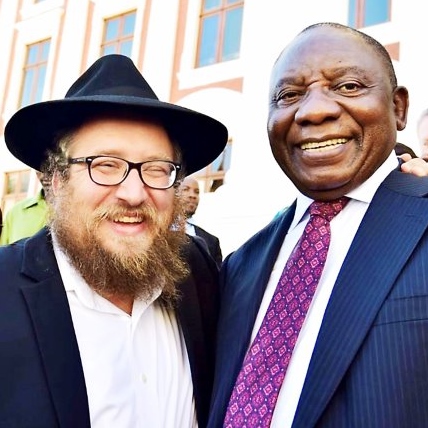click to dowload our latest edition
CLICK HERE TO SUBSCRIBE TO OUR NEWSLETTER


Published
6 years agoon
By
adminRABBI ASHER DEREN
Like many of my fellow South Africans, I am relieved that the country has a new leader.
After 10 years of enduring the relentless onslaught of our past president Jacob Zuma’s corruption charges, the shameful rape case, continuous allegations of state capture and theft, his nauseatingly close friendship with Hamas and his shameful disregard for the dignity of the nation, the people of South Africa (and people across the world, for that matter) were thirsty for change, for someone who could make it all come right.
But as the dust settled, the questions started. What about the downgrading of relations with Israel? And what of an ANC MP’s comments, going undisputed, confirming that the country would “cut diplomatic ties” with Israel? And what of another member of the ruling party’s remarks against Cape Town Premier Helen Zille, accusing her of fabricating Day Zero in collusion with the so-called Jewish mafia – with no demand by her party, headed by Ramaphosa, for her to withdraw the statement?
Uh-oh. Suddenly the chatter around the table isn’t so simple anymore. Maybe he isn’t the messiah and land expropriation isn’t a side issue, after all. And, you know, his deputies are all from the old regime anyway, so it really isn’t such a change. Here we go…
We’ve been here before.
We’ve already had a tale of two such leaders. Let me remind you of that time.
Then – as in our present-day situation – we found ourselves living in the grip of corrupt leadership. At the helm was a selfish, criminal misogynist beholden to a greedy family of cunning advisers and leeches, friendly with anti-Semitic ministers and obsessed with accumulating wealth and power.
The second leader was, like our new president, a breath of fresh air. He was a compassionate leader, a friend of the people, and had a good relationship with the Jewish community. He also had greater insight into our relationship with Israel.
Only then, the leaders were the one and the same Achashverosh of the Purim story.
In the first half of the story, we encounter an evil despot, banishing his wife, flaunting his wealth in the company of raucous friends and associates, and then shamelessly selling out the Jewish people to the genocidal dreams of Haman, the Hamas of his time.
In the second half of the story, we encounter a kind and compassionate king, respectful to his wife Queen Esther and her visionary uncle, Mordechai, and beginning a new relationship with the Jewish people, laying the foundation our sages tell us, for the rebuilding of the Temple in Jerusalem.
Then, too, there may have been a momentary flash of adulation for the “new” king, but thanks to the faithful leadership at that critical time, Mordechai was able to direct our focus towards who we are as a people, and our responsibility as leaders because of that.
This week 26 years ago, in February 1992, I merited to have my last face-to-face audience with my beloved mentor and leader, the Lubavitcher Rebbe of righteous memory, when he personally gifted me with a copy of his fascinating essay on different responses to the different forms of Achashverosh. It serves as my inspiration for the two models of a Jewish community living in the diaspora that I’ve presented here.
When living under a Zupta-style Achashverosh the response is obvious, and almost natural, for a Jew: Be strong. Resist. Oppose. Protest. Be ready to give your life, as exemplified by Mordechai when he gathered the 22 000 Jewish children of Shushan, studying Torah and praying with them in public for the welfare of their people.
But the Ramaphosa Achashverosh requires a far more nuanced approach. Here, as in the story of Purim, we run the risk of falling into a false sense of tranquillity where the luxuries of our current lifestyle lull our sense of responsibility to transform our world – and we risk becoming immune to the simmering truths that this world (and South Africa in particular, under any president) is still very far from perfect.
“And the Jews accepted at that time” is how the Megillah describes the atmosphere under the newly benevolent Achashverosh. For the first time in history, the Jews were then living in the paradox of an exile that supported them, albeit relatively, while still holding them far from the vision of our prophets of a world perfected and redeemed.
And they “accepted” their Sinai mandated role to be agents of change for good, through actively committing to a life of Torah and mitzvah, conscious of the presence of G-d in totality.
We too must “accept”, as they did then, our role as vigilant custodians of the gifts Hashem has given us in our beautiful South Africa. Part of this role is to help our compatriots achieve real and lasting change, far beyond the momentary thrill in the image that any selfie might give us.
We must recommit ourselves to being proud Jews and leaders, not just when it comes to protesting a Zuma-sanctioned BDS outside Woolworths.
Because, in truth, every moment carries an opportunity for us to be leaders and render our skills and services for the betterment of our beloved country. This can be done in every act of goodness and kindness for our fellow South Africans, or more broadly working towards radical transformation of the world at large. The latter could be achieved through a passionately inspired commitment to a soul infused life of torah and mitzvah.
In this way, we move forward with the knowledge that “Moshiach is coming soon, and it will be even better thereafter”.
